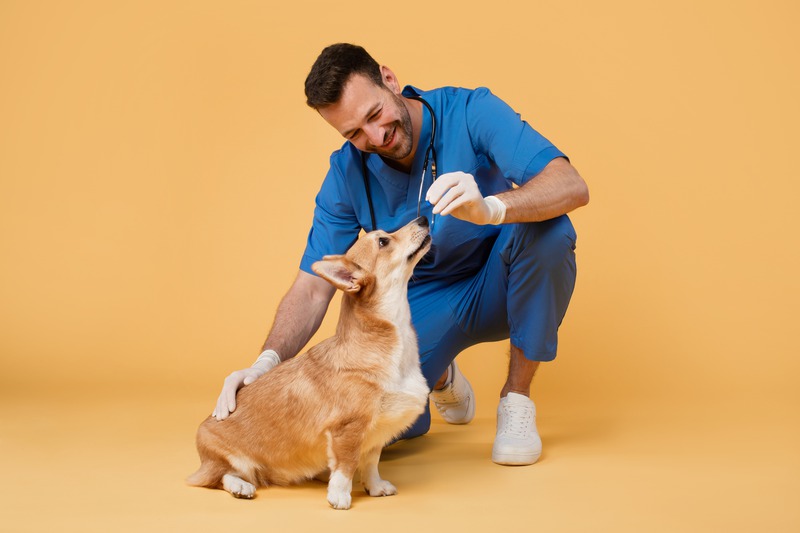Finding a trusted veterinarian for your pet goes beyond a simple Google search or flipping through the Yellow Pages. It’s about seeking a professional who’ll not only provide top-tier medical care but also nurture a gentle, understanding relationship with your furry, scaly, or feathery companion. Whether it’s a routine check-up, a complex surgical procedure, or specialized care for your unique pet, this article will guide you in finding that perfect vet.
1. Ask for Recommendations
Seek recommendations from friends, family, or online pet owner communities. Their firsthand experiences can offer valuable insights into the quality of care provided by local veterinarians. Joining forums or groups dedicated to pet ownership expands your network of potential sources. By gathering diverse opinions and experiences, you can make a more informed decision about which veterinarians to consider for your pet’s care.
2. Check Online Reviews
Utilize online review platforms like Yelp or Google Reviews to gather feedback from other pet owners. Look for trends in reviews to gauge the reputation and reliability of various veterinary clinics. While individual experiences may vary, common themes can help you assess the quality of care, customer service, and overall satisfaction provided by different veterinarians in your area.
Regular wellness exams are a cornerstone of preventive health care, and the right veterinarian can set a healthy foundation for your pet. For those seeking pet wellness exams, it’s vital to find a clinic that offers comprehensive services and personable care that meets the specific needs of your pet. You can also check this website: https://www.dmvet.net/site/veterinary-services-des-moines/cat-dog-routine-exams for reliable pet wellness exam providers.
3. Contact Accredited Organizations
Visit websites of reputable veterinary associations such as the AVMA or BVA. Utilize their directories to find accredited veterinarians in your area. These organizations maintain strict standards for education, training, and ethical conduct, ensuring that their members adhere to best practices in veterinary medicine. By choosing a veterinarian affiliated with such organizations, you can have confidence in their qualifications and commitment to excellence.
4. Visit the Clinic
Schedule visits to prospective veterinary clinics to evaluate their facilities and staff. Pay attention to cleanliness, organization, and staff demeanor during your visit. A welcoming and well-maintained clinic environment, coupled with friendly and knowledgeable staff, can indicate a commitment to providing quality care for your pet. Observing interactions between staff and animals can also give you insight into the level of compassion and professionalism at the clinic.
Coming to terms with the fact that your pet needs surgery can be daunting. You want assurance that they’ll be in good hands. Research into the clinic’s surgical track record and the qualifications of its staff can provide that comfort. A practice equipped with modern surgical facilities and a transparent approach to postoperative care shows they take your pet’s well-being seriously. To get a sense of the care they deliver, look into their veterinary surgical services.
5. Ask Questions
Prepare a list of questions to ask during visits or when contacting veterinary clinics. Inquire about the veterinarian’s qualifications, experience, and approach to pet care. Ask about preventive care measures, treatment options, and emergency services. By seeking clarification on these matters, you can gain a better understanding of the clinic’s policies and capabilities, helping you make an informed decision about your pet’s healthcare provider.
6. Consider Specializations
Evaluate your pet’s specific needs and seek out veterinarians with relevant expertise or specializations. For example, if you have an exotic pet or a pet with a chronic condition, look for veterinarians experienced in these areas. By prioritizing compatibility between your pet’s needs and the veterinarian’s skill set, you can ensure tailored and effective care. Specialized knowledge can be particularly beneficial for addressing complex medical issues or unique species requirements.
7. Emergency Services
Ensure that the veterinary clinic you choose offers emergency services or has partnerships with nearby emergency facilities. Inquire about their protocols for handling emergencies and after-hours care. Access to prompt and reliable emergency care is crucial for addressing urgent medical needs. By choosing a clinic with comprehensive emergency services, you can have peace of mind knowing that your pet will receive timely and appropriate care in critical situations.
8. Specialized Care Considerations
Not all pets are the same, and sometimes, you require a vet who understands the unique aspects of your animal’s species or breed. This can be particularly true for non-traditional pets like reptiles, birds, or fish.
Fish may not be the cuddliest pets, but they are captivating creatures that require keen and specialized attention for their veterinary care. Not all veterinarians cater to aquatic pets, so finding the right vet for fish in Des Moines, WA, can provide not just health benefits for your fish but also a learning opportunity for you to better understand and care for your aquatic friends.
9. Trust Your Instincts
Listen to your intuition when selecting a veterinarian for your pet. Pay attention to your overall impressions during interactions with veterinary staff and practitioners. Consider factors such as communication style, empathy, and genuine interest in your pet’s well-being. Trust is essential in the veterinarian-client-patient relationship, so it’s important to feel comfortable and confident in your choice of veterinary care provider. If something feels off, continue your search until you find a veterinarian who meets your standards and earns your trust.
10. Accessibility and Location
When your pet is ill or injured, immediate attention is often necessary. Consequently, a vet clinic’s location and accessibility can be crucial. Look for clinics with reasonable operating hours, emergency services, and a location that is convenient for you to travel to, particularly in urgent situations.
Final Thoughts
As you search for a trusted vet for your pet, remember to listen to your instincts. Your observations, coupled with a vet’s reputation, credentials, and approach to animal care, should guide you to make an informed decision. In the end, it’s a partnership aimed at giving your pet the best care possible.

